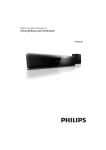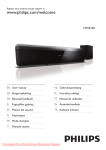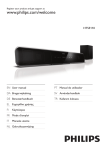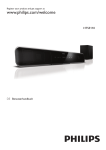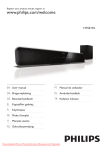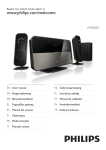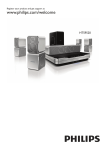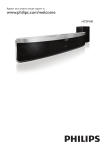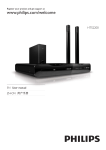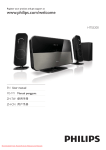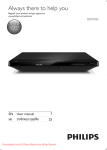Download Philips HTS5120
Transcript
Register your product and get support at www.philips.com/welcome HTS5120 EN User manual HI उपयोगकर्ता पसु ्तिका RU Руководство пользователя UK Посібник користувача 1 Notice Copyright About Progressive Scan Trademarks 2 2 2 2 2 Important 3 Safety 3 Product care 4 Disposal of your old product and batteries 4 7 Update software 16 Check software version 16 Update software from a CD-R or USB 16 8 Product specifications 17 9 Troubleshooting 18 10 Index 19 3 Your home theater 5 Main unit 5 Remote control 5 4 Connect your home theater 7 Connectors 7 Connect to the TV 7 Connect audio from TV or other devices 8 Connect a Philips Dock for iPod/iPhone 9 5 Use your home theater 10 Before you start 10 Choose your sound 10 Play a disc 11 Play from a USB storage device 11 More play features for disc or USB 12 Play from radio 12 Play audio from TV or other devices 13 Play from an MP3 player 13 Play from an iPod or iPhone 13 Use Philips EasyLink 14 6 Change settings 14 Access the setup menu 14 Change general settings 15 Change audio settings 15 Change video settings 15 Change preference settings 16 EN 1 Eng lis h Contents 1 Notice Copyright This item incorporates copy protection technology that is protected by U.S. patents and other intellectual property rights of Rovi Corporation. Reverse engineering and disassembly are prohibited. About Progressive Scan Consumers should note that not all high definition television sets are fully compatible with this product and may cause artifacts to be displayed in the picture. In case of 525 or 625 progressive scan picture problems, it is recommended that the user switch the connection to the ‘standard definition’ output. If there are questions regarding our TV set compatibility with this model 525p and 625p DVD player, please contact our customer service center. Trademarks DivX® and DivX Ultra® are registered trademarks of DivX, Inc. and are used under license. DivX Ultra® Certified to play DivX® video with advanced features and premium content. ABOUT DIVX VIDEO: DivX® is a digital video format created by DivX, Inc. This is an official DivX Certified device that plays DivX video. Visit www.divx.com for more information and software tools to convert your files into DivX video. 2 EN ABOUT DIVX VIDEO-ON-DEMAND: This DivX Certified ® device must be registered in order to play DivX Video-on-Demand (VOD) content. To generate the registration code, locate the DivX VOD section in your device setup menu. Go to vod.divx.com with this code to complete the registration process and learn more about DivX VOD. Manufactured under license from Dolby Laboratories. Dolby, Pro Logic and the double-D symbol are trademarks of Dolby Laboratories. ‘DVD Video’ is a trademark of DVD Format/ Logo Licensing Corporation. HDMI, and HDMI logo and High-Definition Multimedia Interface are trademarks or registered trademarks of HDMI licensing LLC. The USB-IF Logos are trademarks of Universal Serial Bus Implementers Forum, inc. Windows Media and the Windows logo are trademarks, or registered trademarks of Microsoft Corporation in the United States and/ or other countries. Manufactured under license under U.S. Patent #’s: 5,451,942; 5,956,674; 5,974,380; 5,978,762; 6,487,535 & other U.S. and worldwide patents issued & pending. DTS and the Symbol are registered trademarks & DTS Digital Surround and the DTS logos are trademarks of DTS, Inc. Product includes software. © DTS, Inc. All Rights Reserved. CLASS 1 LASER PRODUCT Eng lis h 2 Important Read and understand all instructions before you use your home theater. If damage is caused by failure to follow instructions, the warranty does not apply. Safety Risk of electric shock or fire! •• Never expose the product and accessories to rain or water. Never place liquid containers, such as vases, near the product. If liquids are spilt on or into the product, disconnect it from the power outlet immediately. Contact Philips Consumer Care to have the product checked before use. •• Never place the product and accessories near naked flames or other heat sources, including direct sunlight. •• Never insert objects into the ventilation slots or other openings on the product. •• Where the mains plug or an appliance coupler is used as the disconnect device, the disconnect device shall remain readily operable. •• Disconnect the product from the power outlet before lightning storms. •• When you disconnect the power cord, always pull the plug, never the cable. Risk of short circuit or fire! •• Before you connect the product to the power outlet, ensure that the power voltage matches the value printed on the back or bottom of the product. Never connect the product to the power outlet if the voltage is different. Risk of injury or damage to the home theater! •• For wall-mountable products, use only the supplied wall mount bracket. Secure the wall mount to a wall that can support the combined weight of the product and the wall mount. Koninklijke Philips Electronics N.V. bears no responsibility for improper wall mounting that results in accident, injury or damage. EN 3 •• For speakers with stands, use only the supplied stands. Secure the stands to the speakers tightly. Place the assembled stands on flat, level surfaces that can support the combined weight of the speaker and stand. •• Never place the product or any objects on power cords or on other electrical equipment. •• If the product is transported in temperatures below 5°C, unpack the product and wait until its temperature matches room temperature before connecting it to the power outlet. •• Visible and invisible laser radiation when open. Avoid exposure to beam. •• Do not touch the disc optical lens inside the disc compartment. Risk of overheating! •• Never install this product in a confined space. Always leave a space of at least four inches around the product for ventilation. Ensure curtains or other objects never cover the ventilation slots on the product. Risk of contamination! •• Do not mix batteries (old and new or carbon and alkaline, etc.). •• Remove batteries if they are exhausted or if the remote control is not to be used for a long time. •• Batteries contain chemical substances, they should be disposed of properly. Product care •• •• •• •• 4 Do not insert any objects other than discs into the disc compartment. Do not insert warped or cracked discs into the disc compartment. Remove discs from the disc compartment if you are not using the product for an extended period of time. Only use microfiber cloth to clean the product. EN Disposal of your old product and batteries Your product is designed and manufactured with high quality materials and components, which can be recycled and reused. When this crossed-out wheeled bin symbol is attached to a product it means that the product is covered by the European Directive 2002/96/ EC. Please inform yourself about the local separate collection system for electrical and electronic products. Please act according to your local rules and do not dispose of your old products with your normal household waste. Correct disposal of your old product helps to prevent potential negative consequences for the environment and human health. Your product contains batteries covered by the European Directive 2006/66/EC, which cannot be disposed with normal household waste. Please inform yourself about the local rules on separate collection of batteries because correct disposal helps to prevent negative consequences for the environmental and human health. Remote control Congratulations on your purchase, and welcome to Philips! To fully benefit from the support that Philips offers, register your home theater at www. philips.com/welcome. 1 Main unit 3 Eng lis h 3 Your home theater 2 4 5 6 23 7 8 22 21 a Disc compartment 20 9 10 b (Open/Close) Opens or closes the disc compartment. 19 c (Play/Pause) Starts, pauses or resumes disc play. 18 d SOURCE 11 Selects an audio/video source for the home theater. e (Standby-On) Switches the home theater on or to standby. f +/- (Volume) Increases or decreases volume. 17 16 15 12 13 14 g Display panel a b (Standby-On) Switches the home theater on or to standby. • When EasyLink is enabled, press and hold for at least three seconds to switch all connected HDMI CEC compliant devices to standby. • OPEN/CLOSE Opens or closes the disc compartment. EN 5 c Audio Source • DISC: Switches to disc source. • USB: Switches to USB storage device. • RADIO: Switches to FM radio. • AUDIO SOURCE: Selects an audio input source. DOCK for iPod: Switches to Philips Dock for iPod/iPhone. • d e SETUP Accesses or exits the setup menu. (Navigation buttons) Navigate menus. In video mode, press left or right to fast backward or fast forward. In radio mode, press left or right to search a radio station; press up or down to fine tune a radio frequency. • • • f (Fast Backward) (Fast Forward) Fast backwards or fast forwards. Press repeatedly to change the search speed. g INFO Displays information about what is playing. h (Play/Pause) Starts, pauses or resumes disc play. i • • (Stop) Stops disc play. In radio mode, erases the current preset radio station. j TREBLE / BASS Changes treble or bass. Use with +/-. k Numeric buttons Selects an item to play. l AUDIO SYNC • Selects an audio language or channel. • Press and hold to synchronize audio with video. Use with +/-. m SOUND MODE Selects a predefined sound effect. n REPEAT / PROGRAM • Selects a repeat or shuffle mode. • In radio mode, programs radio stations. o ZOOM Zooms into a video scene or picture. 6 EN p HDMI / ANGLE • Selects video resolution of HDMI • output from the home theater. Displays options for different camera angles. q SUBTITLE Selects subtitle language for video. r SURROUND Selects Dolby Virtual Speaker surround sound. s +/Increases or decreases volume. t (Mute) Mutes or restores volume. u / (Previous/Next) Skips to the previous or next track, chapter or file. v BACK Returns to a previous menu screen. w OK Confirms an entry or selection. Back connectors Eng lis h 4 Connect your home theater This section helps you connect your home theater to a TV and other devices. The basic connections of the home theater with its accessories are provided in the Quick Start. For a comprehensive interactive guide, see www.connectivityguide. philips.com. Note •• Refer to the type plate at the back or bottom of the product for identification and supply ratings. •• Before you make or change any connections, ensure that all devices are disconnected from the power outlet. a DC IN Connects to the AC-DC adapter. (Model: PHILIPS G721DA-270250) b FM ANTENNA Connectors Side connectors Connects the FM antenna for radio reception. c AUX IN Connects to the analog audio output on the TV or an analog device. d VIDEO OUT Connects to the composite video input on the TV. e COMPONENT VIDEO OUT Connects to the component video input on the TV. f HDMI OUT Connects to the HDMI input on the TV. g COAXIAL IN a (USB) Audio, video or picture input from a USB storage device. b MP3 LINK Audio input from an MP3 player. c DOCK for iPod Connects to a Philips Dock for iPod/iPhone. (Model: PHILIPS DCK3060, sold separately) Connects to the coaxial audio output on the TV or a digital device. h OPTICAL IN Connects to the optical audio output on the TV or a digital device. Connect to the TV Connect your home theater directly to a TV through one of the following connectors (from highest to basic quality video): a HDMI b Component video c Composite video EN 7 Option 1: Connect to the TV through HDMI Option 3: Connect to the TV through composite video (CVBS) Note TV •• The composite video cable or connector might be labeled AV IN, VIDEO IN, COMPOSITE or BASEBAND. TV Note •• If the HDTV has a DVI connector, connect using an HDMI/DVI adapter. •• If the TV supports EasyLink HDMI CEC, control the home theater and TV with one remote control (see ‘Use Philips EasyLink’ on page 14). Option 2: Connect to the TV through YPbPr (component video) Note •• The component video cable or connector might be labeled Y Cb Cr or YUV. Connect audio from TV or other devices Use your home theater to play audio from the TV or other devices such as a cable box. Choose from the following connectors. Tip •• Press AUDIO SOURCE repeatedly to select the audio output of your connection. TV Component Video In Option 1: Connect audio through a digital coaxial cable Note •• The digital coaxial cable or connector might be labeled COAXIAL DIGITAL OUT or SPDIF OUT. (Cable not supplied) TV 8 EN Note Option 4: Connect audio through an HDMI cable Eng lis h Option 2: Connect audio through a digital optical cable Note •• The digital optical cable or connector might be labeled SPDIF OUT or OPTICAL OUT. (Cable not supplied) •• The HDMI connector on the TV might be labeled HDMI 1 or HDMI ARC. This feature works with Audio Return Channel (ARC) compatible devices only. TV Option 3: Connect audio through analog audio cables Connect a Philips Dock for iPod/iPhone (Cable not supplied) TV DOCK for iPod Note •• Philips iPod Dock is sold separately. •• You can use the iPod Dock to charge the iPod while the home theater is in iPod mode. EN 9 5 Use your home theater Change sound mode Select predefined sound modes to suit your video or music. This section helps you use the home theater to play media from a wide range of sources. Before you start Check that you: •• Make the necessary connections and complete the setup as described in the Quick Start. •• Switch the TV to the correct source for the home theater. Choose your sound This section helps you choose the ideal sound for your video or music. Change treble or bass Change the high frequency (treble) or low frequency (bass) settings of the home theater to suit your video or music. Press SOUND MODE repeatedly to cycle through the available sound modes. Sound mode Description ACTION / ROCK Enhanced low and high-range. Ideal for action movies and rock or pop music. DRAMA / Clear mid and high-range. Ideal JAZZ for drama movies and jazz music. CONCERT / Neutral sound. Ideal for live CLASSIC concerts and classical music. SPORTS Moderate mid-range and surround effects for clear vocals and the atmosphere of a live sport venue. NIGHT Dynamically controlled sound mode suitable for watching movies at night or for nonintrusive background music. Change surround mode 1 2 DVS (Dolby Virtual Speaker) technology creates a highly compelling 5.1-channel listening experience from as few as two speakers. Press TREBLE or BASS. Press +/- within five seconds to increase or decrease treble or bass. Select surround sound During play, press SURROUND to switch on or off the surround sound effect. 10 EN The home theater can play a wide variety of discs, including video, audio and mixed media (for example, a CD-R that contains JPEG pictures and MP3 music). Insert a disc into the home theater. Press DISC. »» The disc plays or the disc main menu appears. 1 2 3 Press the following buttons to control play: Button Action Navigation buttons OK Navigate menus. / / ZOOM Confirms an entry or selection. Starts, pauses or resumes play. Stops play. Skips to the previous or next track, chapter or file. Fast backwards or fast forwards. Press repeatedly to change the search speed.In pause mode, steps backward (DVD only) or forward by one frame. Zooms into a video scene or picture. Use video options Access several useful features while viewing video. Available video options depend on the video source. Button Action Searches slow-backward or slow-forward. Press repeatedly to change the search speed. For VCD/SVCD, slow-backward search is not available. AUDIO Selects an audio language or channel. SYNC SUBTITLE Selects subtitle language for video. Displays information about what INFO is playing. REPEAT Repeats a chapter or title. ANGLE Displays options for different camera angles. / Use picture options Access several useful features while viewing pictures. Button / / REPEAT INFO Eng lis h Play a disc Action Rotates the picture counterclockwise or clockwise. Skips to the previous or next picture. Repeats a single file in the folder or repeats the entire folder. Shuffles files in a folder. Displays photo albums in a thumbnail overview. Use audio options Access several useful features while audio is played. Button Action REPEAT Repeats a track, the entire disc or shuffle tracks. Play from a USB storage device The home theater is fitted with a USB connector that allows you to view pictures, listen to music or watch movies stored on a USB storage device. Connect the USB storage device to the home theater. Press USB. »» A content browser appears. 1 2 3 4 Select a file, then press OK. Press the playback buttons to control play (see ‘Play a disc’ on page 11). Note •• If the USB storage device does not fit into the connector, use a USB extension cable. •• The home theater does not support digital cameras that need a computer program to display photos. •• The USB storage device must be FAT or DOSformatted, and Mass Storage Class compliant. EN 11 More play features for disc or USB Several advanced features are available for video or picture playback from a disc or USB storage device. Play a musical slideshow Play music and pictures simultaneously to create a musical slideshow. The files must be stored on the same disc or USB storage device. Select a music track, then press OK. Press BACK and go to the picture folder. Select a picture, then press OK to start slideshow. Press to stop slideshow. Press again to stop music. 1 2 3 4 5 Synchronize audio with video If the audio and video are not synchronized, you can delay the audio to match the video. Press and hold AUDIO SYNC until the audio sync message appears on the display panel. Press +/- within five seconds to sync the audio with your video. 1 2 Repeat play a specific section Select sections of audio or video for repeat playback. During playback, press INFO. Select [Repeat] > [Repeat AB] in the menu. Press OK to mark the start point. Press OK again to mark the end point. »» Repeat play starts. • To cancel repeat A-B, press INFO, select [Repeat] > [Off], then press OK. 1 2 3 4 Note •• Repeat play is only possible within a track/chapter. Play from radio 1 2 Check that the FM antenna is connected. Press RADIO. »» “AUTO INSTALL...PRESS PLAY’ appears on the display panel if you have not installed any radio stations. Press . 3 Press the following buttons to control play: Button / / Quick skip play to a specific time Quick skip to a specific part of a video by entering the time of a scene. During video play, press INFO. Press the Navigation buttons and OK to select: • [TT Time] : Title time. • [Ch Time] : Chapter time. • [Disc Time] : Disc time. • [Track Time] : Track time. PROGRAM 1 2 3 Enter the time of the scene, then press OK. Action Selects a preset radio station. Searches for a radio station. Fine tunes a radio frequency. Press and hold to erase the preset radio station. Manual: Press once to access program mode, press / to assign a number to the radio station, then press again to store the radio station. Automatic: Press and hold for three seconds to reinstall radio stations. Note •• The home theater can store up to 40 radio stations. •• Press to stop the installation. •• AM and digital radio are not supported. •• If no stereo signal is detected, or if fewer than five stations are found, you are prompted to install the radio stations again. •• For the best reception, place the antenna away from the TV or other sources of radiation. 12 EN In some countries, you can switch the FM tuning grid between 50 kHz and 100 kHz. Changing tuning grid erases all preset radio stations. Press RADIO. Press . Press and hold until ‘GRID 9’ (50 kHz) or ‘GRID 10’ (100 kHz) is displayed. 1 2 3 Play audio from TV or other devices Dock your iPod or iPhone 1 Connect the dock to the home theater and connect the yellow composite cable from the dock to the TV. For more information, see the Quick Start provided with the dock. Switch on the iPod or iPhone and place it in the dock. 2 Listen to music 1 Dock your iPod or iPhone (see ‘Dock your iPod or iPhone’ on page 13). Press DOCK for iPod on the home theater remote control. Browse on the iPod or iPhone screen to select track. Press OK to play the track. 2 Press AUDIO SOURCE repeatedly to select the audio output of the connected device (see ‘Connect audio from TV or other devices’ on page 8). 3 Play from an MP3 player Watch video or view slideshows Connect and play audio files from an MP3 player or other external audio devices. Connect the MP3 player to the home theater. Press AUDIO SOURCE repeatedly until ‘MP3 LINK’ appears on the display panel. Press the buttons on the MP3 player to select and play audio files. 1 2 3 Play from an iPod or iPhone By connecting and installing a Philips Dock for iPod/iPhone, you can use the home theater to play music, movies and photos from your iPod or iPhone. Note •• Philips Dock for iPod/iPhone is sold separately. •• You can charge your iPod/iPhone on the dock 4 Note •• On iPod, enable the TV ON setting. •• On iPhone, select the TV Out option. 1 Dock your iPod or iPhone (see ‘Dock your iPod or iPhone’ on page 13). Press DOCK for iPod on the home theater remote control. Switch the TV to the AV/VIDEO source (corresponding to the yellow composite cable). »» The TV screen goes blank. 2 3 4 Browse on the iPod or iPhone screen to select videos or photos. Press OK on the home theater remote control or PLAY on the iPod/iPhone to play the video or photos. »» The picture is displayed on the TV. 5 while the home theater is in iPod mode. EN 13 Eng lis h Change tuning grid Use Philips EasyLink 6 Change settings The home theater supports Philips EasyLink, which uses the HDMI CEC (Consumer Electronics Control) protocol. EasyLink-compliant devices that are connected through HDMI connectors can be controlled by a single remote control. This section helps you to change the settings of your home theater. Note Caution •• Many of the settings are already configured with the best value for the home theater. Unless you have a specific reason to change a setting, it is best to leave it at the default value. •• Philips does not guarantee 100% interoperability with all HDMI CEC devices. 1 2 3 4 5 6 Switch on the HDMI CEC operations on the TV and other connected devices. See the manual of the TV or other devices for details. Press SETUP. Select [General Setup], then press OK. Select [EasyLink Setup], then press OK. Select and adjust the following settings: • [EasyLink] : Enables or disables EasyLink. • [One Touch Play] : Enables or disables One Touch Play. If enabled, you can use the remote control to start disc play in the home theater and the TV switches automatically to the correct channel. • [One Touch Standby] : Enables or disables One Touch Standby. If enabled, the home theater can be switched off to standby by a remote control from the TV or other connected HDMI CEC devices. • [System Audio Control] :Enables or disables System audio control. If enabled, follow the instructions on the TV to map the connected devices correctly to the audio connectors of the home theater. The home theater switches automatically to the audio source of the connected device. • [Audio Input Mapping] : Updates audio input mapping if there are new devices connected. Press OK to confirm your choice. Note •• The connected devices must be connected through HDMI and switched on. 14 EN Access the setup menu 1 Press SETUP. »» The following menu appears. Symbol Description [General Setup] [Audio Setup] [Video Setup] [Preference Setup] 2 Select a setup menu, then press OK. See the following sections for information about how to change the settings of your home theater. Press BACK to return to the previous menu, or press SETUP to exit. 3 Note •• You cannot change a setting that is grayed out. Change video settings 1 2 3 1 2 3 4 Press SETUP. Select [General Setup], then press OK. Select and adjust the following settings: • [EasyLink Setup] : Sets up EasyLink to enjoy easy controls of all the HDMI CEC compliant devices using a single remote control (see ‘Use Philips EasyLink’ on page 14). • [Disc Lock] : Restricts play to disc. Password (PIN code) is required to unlock the disc before play. • [Display Dim] : Changes the brightness of the display panel. • [OSD Language] : Selects the onscreen display menu language. • [Screen Saver] : Enables or disables screen saver mode. If enabled, the screen enters idle mode after 10 minutes of inactivity (for example, in pause or stop mode). • [Sleep Timer] : Sets a sleep timer to switch the home theater to standby after a specific time. • [DivX® VOD Code] : Displays the DivX VOD registration code for the home theater. Press OK to confirm your choice. Note 4 Press SETUP. Select [Video Setup], then press OK. Select and adjust the following settings: • [TV System] : Selects a TV system that is compatible with the TV. • [TV Display] : Selects a picture display format to fit the TV screen. • [Picture Settings] : Selects a predefined color setting. • [HDMI Setup] : Selects HDMI video resolution and the wide screen display format for the TV. The Wide Screen Display option is only available for 16:9 wide screen TV display setting. • [Progressive] : Enables or disables progressive scan mode. Press OK to confirm your choice. Note •• The best setting is automatically selected for the TV. If you need to change the setting, ensure that the TV supports the new setting. •• Some video settings depend on the video source, ensure that the disc and the TV support the setting or feature. •• For settings related to HDMI, the TV must be connected through HDMI. •• For settings related to progressive scan mode, the TV must be connected through Component Video. •• Before you purchase DivX videos and play them on the home theater, register the home theater on www.divx.com using the DivX VOD code. Change audio settings 1 2 3 4 Press SETUP. Select [Audio Setup], then press OK. Select and adjust the following setting: [HDMI Audio] : Enables or disables HDMI audio output for the TV.For settings related to HDMI, the TV must be connected through HDMI. Press OK to confirm your choice. EN 15 Eng lis h Change general settings Change preference settings 7 Update software 1 2 3 To check for new updates, compare the current software version of your home theater with the latest software version (if available) on the Philips web site. 4 Press SETUP. Select [Preference Setup], then press OK. Select and adjust the following settings: • [Audio] : Selects audio language for video. • [Subtitle] : Selects subtitle language for video. • [Disc Menu] : Selects menu language for video disc. • [Parental] : Restricts access to discs that are recorded with ratings. To play all discs irrespective of the rating, select level ‘8’. • [PBC] : Displays or skips the content menu for VCD and SVCD discs. • [MP3/JPEG Display] : Displays the MP3/JPEG folders or all the files. • [Password] : Sets or changes a PIN code to play a restricted disc. Enter ‘0000’ if you do not have a PIN or if you have forgotten your PIN. • [DivX Subtitle] : Selects a character set that supports the DivX subtitle. • [Version Info.] : Displays the software version for the home theater. • [Default] : Resets the home theater to the default settings programmed at the factory. Press OK to confirm your choice. Note •• If you select a language that is not available on a disc, the home theater uses the default language of the disc. •• You cannot reset disc lock, password (PIN code) and parental control settings to their default values. 16 EN Check software version 1 2 Press SETUP. Select [Preference Setup] > [Version Info.], then press OK. »» The software version is displayed. Update software from a CD-R or USB 1 2 Check for the latest software version on www.philips.com/support. • Search for your model and click on ‘software&drivers’. Download the software onto a CD-R or USB storage device. Insert the CD-R or connect the USB storage device to the home theater. Follow the instructions on the TV to confirm the update. »» When complete, the home theater automatically switches off and on again. • If not, disconnect the power cord for a few seconds and then reconnect it. 3 4 Caution •• Do not turn off the power or remove the CD-R or USB storage device when the software update is in progress because you might damage the home theater. Note •• Specification and design are subject to change without notice. Region code For information about which region this home theater supports, see the type plate on the back or bottom. Country DVD Europe, United Kingdom Asia Pacific, Taiwan, Korea Latin America Australia, New Zealand Russia, India China Playback media DVD-Video, DVD+R/+RW, DVD-R/-RW, DVD+R DL, CD-R/CD-RW, Audio CD,Video CD/SVCD, Picture CD, MP3-CD,WMA-CD, DivX-CD, USB storage device File Format •• Audio: .mp3, .wma •• Video: .avi, .divx, .wmv •• Picture: .jpg Amplifier •• Total output power: 400 W RMS •• Frequency response: 20 Hz-20 kHz / ±3dB •• Signal-to-noise ratio: > 65 dB (CCIR) / (A-weighted) •• Input sensitivity: • AUX: 2 V • MP3 LINK: 1 V Video •• Signal system: PAL / NTSC •• Component video output: 480i/576i, 480p/576p, 720p, 1080i •• HDMI output 480p, 576p, 720p, 1080i, 1080p Audio •• S/PDIF Digital audio input: • Coaxial: IEC 60958-3 • Optical: TOSLINK •• Sampling frequency: • MP3: 32 kHz, 44.1 kHz, 48 kHz • WMA: 44.1 kHz, 48 kHz •• Constant bit rate: • MP3: 112 kbps - 320 kbps • WMA: 48 kbps - 192 kbps Radio •• Tuning range: FM 87.5-108 MHz (50/100 kHz) •• Signal-to-noise ratio: FM 50 dB •• Frequency response: FM 180 Hz ~ 10 kHz / ±6dB USB •• Compatibility: Hi-Speed USB (2.0) •• Class support: UMS (USB Mass Storage Class) •• File system: FAT12, FAT16, FAT32 •• Maximum memory support: < 160GB. Main Unit •• Power supply: 27 Vdc; 2.5 A (External switching power adapter) •• Power consumption: 35 W •• Standby power consumption: < 1 W •• Impedance: 8 ohm woofer, 8 ohm tweeter •• Speaker drivers: 3” woofer, 1.5” tweeter •• Frequency response: 150 Hz ~ 20 kHz •• Dimensions (WxHxD): 790.6 x 145 x 57.4 (mm) •• Weight: 2.23 kg Switching power adapter (G721DA-270250) •• Input: 100-240 Vac; 50-60 Hz; 1.35 A •• Output: 27 Vdc; 2.5 A Subwoofer •• Power supply: 230 V; 50 Hz •• Power consumption: 45 W •• Standby power consumption: < 1 W •• System: Bass Reflex System •• Impedance: 8 ohm •• Speaker driver: 6” woofer •• Frequency response: 35 Hz ~ 200 Hz •• Dimensions (WxHxD): 182 x 365 x 306 (mm) •• Weight: 6 kg Wall Mount •• Dimensions (WxHxD): 440 x 60 x 23 (mm) •• Weight: 0.54 kg Laser specification •• Type: Semiconductor laser GaAIAs (CD) •• Wave length: 645 - 665 nm (DVD), 770 - 800 nm (CD) •• Output power: 6 mW (DVD), 7 mW (VCD/CD) EN 17 •• Beam divergence: 60 degrees. Eng lis h 8 Product specifications 9 Troubleshooting Warning •• Risk of electric shock. Never remove the casing of the product. To keep the warranty valid, never try to repair the product yourself. If you have problems using this product, check the following points before you request service. If you still have a problem, register your product and get support at www.philips.com/welcome. If you contact Philips, you will be asked for the model and serial number of your product. The model number and serial number are on the back or bottom of your product. Write the numbers here: Model No. __________________________ Serial No. ___________________________ Main unit The buttons on this home theater do not work. •• Disconnect the home theater from the power outlet for a few minutes, then reconnect. Picture No picture. •• Ensure that the TV is switched to the correct source for the home theater. No picture on HDMI connection. •• Check if the HDMI cable is faulty. Replace with a new HDMI cable. •• If this happens when you change the HDMI video resolution, press HDMI repeatedly until picture appears. Sound No sound from subwoofer In Standby, press and hold (Stop) on the remote control until [PAIRING] flashes on the main unit. Press and hold PAIR on the subwoofer until the blue and green indicators on the subwoofer flash alternately. 1 2 18 EN 3 If the wireless connection succeeds, [PAIR OK] is displayed and the green indicator on the subwoofer lights up. •• If the wireless connection fails, [PAIR FAIL] is displayed, and the blue and green indicators on the subwoofer remain lit. Check whether there is any interference from nearby electronic devices. Remove the conflict or strong interference, then repeat the above procedures. No sound. •• Ensure that the audio cables are connected and select the correct input source (for example, AUDIO SOURCE, USB) for the device you want to play. No sound on HDMI connection. •• You might not hear any sound if the connected device is not HDCP (Highbandwidth Digital Content Protection) compliant or only DVI compatible. Use an analog or digital audio connection. •• Ensure that the [HDMI Audio] is enabled. No sound from TV program. •• Connect an audio cable from the audio input on the home theater to the audio output on the TV, then press AUDIO SOURCE repeatedly to select the correct audio source. Distorted sound or echo. •• Ensure that the TV volume is muted or set to minimum if you are playing audio through the home theater. Audio and video are not synchronized. •• 1) Press and hold AUDIO SYNC. 2) Press +/- within five seconds. Play Disc cannot be played. •• Clean the disc. •• Ensure that the home theater supports the disc (see ‘Product specifications’ on page 17). •• Ensure that the home theater supports the region code of the disc. •• For DVD±RW or DVD±R, ensure that the disc is finalized. 10 Index A amplifier audio connection language synchronize with video audio input mapping 17 8 16 12 14 C care change settings connect audio from TV guide other devices TV connectors contact us 4 14 8, 13 7 8 7 7 18 D disc play supported discs disposal of your product DivX registration code subtitle 11 17 4 15 16 E EasyLink settings 14 F file formats 17 H HDMI CEC (see Easylink) 14 I iPod connect play 9 13 EN 19 Eng lis h DivX video files cannot be played. •• Ensure that the DivX file is encoded according to the ‘Home Theater Profile’ with the DivX encoder. •• Ensure that the DivX video file is complete. DivX subtitles do not display correctly. •• Ensure that the subtitle file name is the same as the movie file name. •• Select the correct character set: 1) Press SETUP. 2) Select [Preference Setup]. 3) Select [DivX Subtitle]. 4) Select a supported character set. 5) Press OK. The contents of a USB storage device cannot be read. •• Ensure that the format of the USB storage device is compatible with the home theater (see ‘Product specifications’ on page 17). •• Ensure that the USB storage device is formatted with a file system that is supported by the home theater (note that NTFS is not supported). ‘No entry’ or ‘x’ sign appears on the TV. •• The operation is not possible. EasyLink feature does not work. •• Ensure that the home theater is connected to a Philips brand EasyLink TV and that EasyLink is on. I do not want my home theater to be switched on when I switch on my TV. •• This is the correct behavior for Philips EasyLink (HDMI-CEC). To make the home theater work independently, switch off EasyLink. The video (movies, photos, video clips, etc.) contents of the iPod/iPhone do not display on TV. •• Video and photo browsing is not supported, you can only browse the video and photo contents on the iPod/iPhone itself. Cannot see pictures from my iPod/iPhone on the TV. •• Connect a yellow composite cable from the dock to the TV. •• Switch the TV to the AV/VIDEO source (corresponding to the yellow composite cable). •• Press PLAY on the iPod or iPhone to start the slideshow. L language audio disc menu on-screen display subtitle S 16 16 15 16 M MP3 play O one-touch play one-touch standby overview connectors main unit remote control P password picture options slide show thumbnail overview troubleshooting play disc MP3 player options radio troubleshooting USB storage device product care product specifications progressive scan 13 14 14 7 5 5 16 11 12, 11 11 18 11 13 11 12 18 11 4 17 2 R radio play program tune tuning grid recycle region code remote control repeat rotate pictures 20 EN 12 12 12 13 4 17 5 11, 12 11 safety settings general parental control preferences restore factory settings slideshow play musical slideshow software update version sound mode treble and bass troubleshooting system audio control T time search video troubleshooting TV audio from TV connect 3 15 16 16 16 12 16 16 10 10 18 14 12 18 8, 13 7 U USB play software update 11 16 V video synchronize with audio video on demand (VOD) 12 15 Language Code Abkhazian 6566 Afar 6565 Afrikaans 6570 Amharic 6577 Arabic 6582 Armenian 7289 Assamese 6583 Avestan 6569 Aymara 6589 Azerhaijani 6590 Bahasa Melayu 7783 Bashkir 6665 Belarusian 6669 Bengali 6678 Bihari 6672 Bislama 6673 Bokmål, Norwegian 7866 Bosanski 6683 Brezhoneg 6682 Bulgarian 6671 Burmese 7789 Castellano, Español 6983 Catalán 6765 Chamorro 6772 Chechen 6769 Chewa; Chichewa; Nyanja 7889 9072 中文 Chuang; Zhuang 9065 Church Slavic; Slavonic 6785 Chuvash 6786 Corsican 6779 Česky 6783 Dansk 6865 Deutsch 6869 Dzongkha 6890 English 6978 Esperanto 6979 Estonian 6984 Euskara 6985 6976 Faroese 7079 Français 7082 Frysk 7089 Fijian 7074 Gaelic; Scottish Gaelic 7168 Gallegan 7176 Georgian 7565 Gikuyu; Kikuyu 7573 Guarani 7178 Gujarati 7185 Hausa 7265 Herero 7290 Hindi 7273 Hiri Motu 7279 Hrwatski 6779 Ido 7379 Interlingua (International)7365 Interlingue 7365 Inuktitut 7385 1_HTS5220_12_EN-US.indd Sec2:33 Inupiaq Irish Íslenska Italiano Ivrit Japanese Javanese Kalaallisut Kannada Kashmiri Kazakh Kernewek Khmer Kinyarwanda Kirghiz Komi Korean Kuanyama; Kwanyama Kurdish Lao Latina Latvian Letzeburgesch; Limburgan; Limburger Lingala Lithuanian Luxembourgish; Macedonian Malagasy Magyar Malayalam Maltese Manx Maori Marathi Marshallese Moldavian Mongolian Nauru Navaho; Navajo Ndebele, North Ndebele, South Ndonga Nederlands Nepali Norsk Northern Sami North Ndebele Norwegian Nynorsk; Occitan; Provencal Old Bulgarian; Old Slavonic Oriya Oromo Ossetian; Ossetic Pali Panjabi Persian Polski Português 7375 7165 7383 7384 7269 7465 7486 7576 7578 7583 7575 7587 7577 8287 7589 7586 7579 7574 7585 7679 7665 7686 7666 7673 7678 7684 7666 7775 7771 7285 7776 7784 7186 7773 7782 7772 7779 7778 7865 7886 7868 7882 7871 7876 7869 7879 8369 7868 7878 7967 6785 7982 7977 7983 8073 8065 7065 8076 8084 Pushto Russian Quechua Raeto-Romance Romanian Rundi Samoan Sango Sanskrit Sardinian Serbian Shona Shqip Sindhi Sinhalese Slovensky Slovenian Somali Sotho; Southern South Ndebele Sundanese Suomi Swahili Swati Svenska Tagalog Tahitian Tajik Tamil Tatar Telugu Thai Tibetan Tigrinya Tonga (Tonga Islands) Tsonga Tswana Türkçe Turkmen Twi Uighur Ukrainian Urdu Uzbek Vietnamese Volapuk Walloon Welsh Wolof Xhosa Yiddish Yoruba Zulu 8083 8285 8185 8277 8279 8278 8377 8371 8365 8367 8382 8378 8381 8368 8373 8373 8376 8379 8384 7882 8385 7073 8387 8383 8386 8476 8489 8471 8465 8484 8469 8472 6679 8473 8479 8483 8478 8482 8475 8487 8571 8575 8582 8590 8673 8679 8765 6789 8779 8872 8973 8979 9085 4/14/2010 10:24:07 AM © 2010 Koninklijke Philips Electronics N.V. All rights reserved. sgptt_1039/51_v3 bk.indd Sec4:48 1/12/2010 2:54:37 PM

























